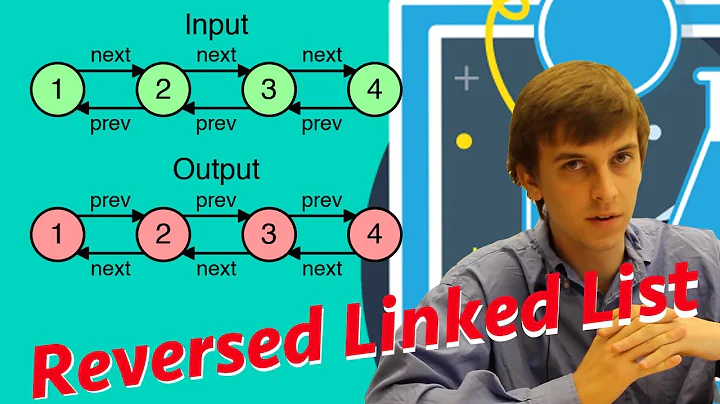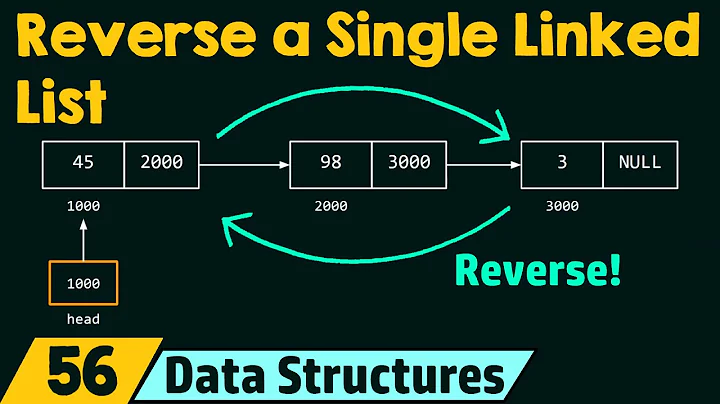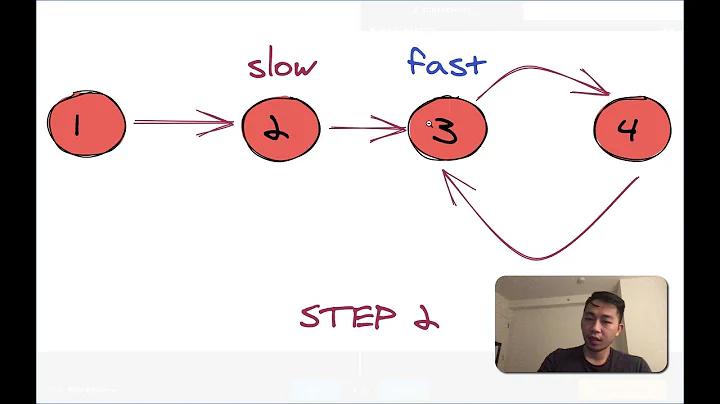How to reverse a singly linked list using only two pointers?
Solution 1
Any alternative? No, this is as simple as it gets, and there's no fundamentally-different way of doing it. This algorithm is already O(n) time, and you can't get any faster than that, as you must modify every node.
It looks like your code is on the right track, but it's not quite working in the form above. Here's a working version:
#include <stdio.h>
typedef struct Node {
char data;
struct Node* next;
} Node;
void print_list(Node* root) {
while (root) {
printf("%c ", root->data);
root = root->next;
}
printf("\n");
}
Node* reverse(Node* root) {
Node* new_root = 0;
while (root) {
Node* next = root->next;
root->next = new_root;
new_root = root;
root = next;
}
return new_root;
}
int main() {
Node d = { 'd', 0 };
Node c = { 'c', &d };
Node b = { 'b', &c };
Node a = { 'a', &b };
Node* root = &a;
print_list(root);
root = reverse(root);
print_list(root);
return 0;
}
Solution 2
I hate to be the bearer of bad news but I don't think your three-pointer solution actually works. When I used it in the following test harness, the list was reduced to one node, as per the following output:
==========
4
3
2
1
0
==========
4
==========
You won't get better time complexity than your solution since it's O(n) and you have to visit every node to change the pointers, but you can do a solution with only two extra pointers quite easily, as shown in the following code:
#include <stdio.h>
// The list element type and head.
struct node {
int data;
struct node *link;
};
static struct node *first = NULL;
// A reverse function which uses only two extra pointers.
void reverse() {
// curNode traverses the list, first is reset to empty list.
struct node *curNode = first;
first = NULL;
// Until no more in list, insert current before first and advance.
while (curNode != NULL) {
// Need to save next node since we're changing the current.
struct node *nxtNode = curNode->link;
// Insert at start of new list.
curNode->link = first;
first = curNode;
// Advance to next.
curNode = nxtNode;
}
}
// Code to dump the current list.
static void dumpNodes() {
struct node *curNode = first;
printf ("==========\n");
while (curNode != NULL) {
printf ("%d\n", curNode->data);
curNode = curNode->link;
}
}
// Test harness main program.
int main (void) {
int i;
struct node *newnode;
// Create list (using actually the same insert-before-first
// that is used in reverse function.
for (i = 0; i < 5; i++) {
newnode = malloc (sizeof (struct node));
newnode->data = i;
newnode->link = first;
first = newnode;
}
// Dump list, reverse it, then dump again.
dumpNodes();
reverse();
dumpNodes();
printf ("==========\n");
return 0;
}
This code outputs:
==========
4
3
2
1
0
==========
0
1
2
3
4
==========
which I think is what you were after. It can actually do this since, once you've loaded up first into the pointer traversing the list, you can re-use first at will.
Solution 3
#include <stddef.h>
typedef struct Node {
struct Node *next;
int data;
} Node;
Node * reverse(Node *cur) {
Node *prev = NULL;
while (cur) {
Node *temp = cur;
cur = cur->next; // advance cur
temp->next = prev;
prev = temp; // advance prev
}
return prev;
}
Solution 4
Here's the code to reverse a singly linked list in C.
And here it is pasted below:
// reverse.c
#include <stdio.h>
#include <assert.h>
typedef struct node Node;
struct node {
int data;
Node *next;
};
void spec_reverse();
Node *reverse(Node *head);
int main()
{
spec_reverse();
return 0;
}
void print(Node *head) {
while (head) {
printf("[%d]->", head->data);
head = head->next;
}
printf("NULL\n");
}
void spec_reverse() {
// Create a linked list.
// [0]->[1]->[2]->NULL
Node node2 = {2, NULL};
Node node1 = {1, &node2};
Node node0 = {0, &node1};
Node *head = &node0;
print(head);
head = reverse(head);
print(head);
assert(head == &node2);
assert(head->next == &node1);
assert(head->next->next == &node0);
printf("Passed!");
}
// Step 1:
//
// prev head next
// | | |
// v v v
// NULL [0]->[1]->[2]->NULL
//
// Step 2:
//
// prev head next
// | | |
// v v v
// NULL<-[0] [1]->[2]->NULL
//
Node *reverse(Node *head)
{
Node *prev = NULL;
Node *next;
while (head) {
next = head->next;
head->next = prev;
prev = head;
head = next;
}
return prev;
}
Solution 5
Robert Sedgewick, "Algorithms in C", Addison-Wesley, 3rd Edition, 1997, [Section 3.4]
In case that is not a cyclic list ,hence NULL is the last link.
typedef struct node* link;
struct node{
int item;
link next;
};
/* you send the existing list to reverse() and returns the reversed one */
link reverse(link x){
link t, y = x, r = NULL;
while(y != NULL){
t = y->next;
y-> next = r;
r = y;
y = t;
}
return r;
}
Related videos on Youtube
Madhan
Updated on July 08, 2022Comments
-
Madhan almost 2 years
I wonder if there exists some logic to reverse a singly-linked list using only two pointers.
The following is used to reverse the single linked list using three pointers namely
p,q,r:struct node { int data; struct node *link; }; void reverse() { struct node *p = first, *q = NULL, *r; while (p != NULL) { r = q; q = p; p = p->link; q->link = r; } first = q; }Is there any other alternate to reverse the linked list? What would be the best logic to reverse a singly linked list, in terms of time complexity?
-
kajaco over 14 yearspossible duplicate: stackoverflow.com/questions/818443/…
-
 paxdiablo over 14 yearsNot really, that's two queues rather than two pointers.
paxdiablo over 14 yearsNot really, that's two queues rather than two pointers. -
 GManNickG over 14 yearsBecause you're here to help, and not play a rep game?
GManNickG over 14 yearsBecause you're here to help, and not play a rep game? -
 Admin over 14 yearsGMan: that's the thing, I'm not sure I'm helping anyone, even him, if he can't follow through.
Admin over 14 yearsGMan: that's the thing, I'm not sure I'm helping anyone, even him, if he can't follow through. -
oneAday over 14 yearsYou're helping those of us who read and get something from the questions and answers. I found it insightful.
-
 Karussell about 14 yearsreversing in O(1) could be done for double linked lists. see my answer.
Karussell about 14 yearsreversing in O(1) could be done for double linked lists. see my answer. -
 Dane over 6 yearsAlmost all answers here have used 3 pointers !!
Dane over 6 yearsAlmost all answers here have used 3 pointers !!
-
-
Left For Archive over 14 years…and a new 64-bit compatibility issue is born, if you're not careful. You're unlikely to buy any performance this way either.
-
poundifdef over 14 yearsThis will not affect the time complexity - that is, it won't make the solution any better than linear time. I mean, you might save 4 or 8 bytes of memory, but that won't change the overall complexity of the algorithm.
-
 Jonathan Leffler over 14 yearsI'm not sure about 'obvious errors' in the original. Design-wise, not passing the head of the list in and not returning the new head is a bad idea. The only bug, though, is the last line in the
Jonathan Leffler over 14 yearsI'm not sure about 'obvious errors' in the original. Design-wise, not passing the head of the list in and not returning the new head is a bad idea. The only bug, though, is the last line in thereverse()function should be setting first, I believe. Otherwise, the original code worked OK when plugged into your neat test harness. You get +1 from me even so - but an explanation of what you consider the 'obvious errors' would improve your answer. -
 paxdiablo over 14 years@rascher, time complexity was the second part of the question. The first part had to do with reducing the number of pointers required.
paxdiablo over 14 years@rascher, time complexity was the second part of the question. The first part had to do with reducing the number of pointers required. -
 Admin over 14 yearsYes,
Admin over 14 yearsYes,q = firstwas biggest error I had in mind, though I consider the confusion over where the input is coming from and how reverse returns a value to be two more; I suppose it was my fault for not looking at it any further than that. -
Will over 14 yearsI think the original poster was looking for a cheap C trick. In my experience - and I have profiled it :) - the typical avoiding intermediary tricks are actually slower than just using an intermediary.
-
Steve Jessop over 14 yearsI think "should" is overstating the case a bit. Your C compiler "might" do a tail-call optimization, and it's easy enough to check for a given compiler/options whether it does or not: look at the disassembly. Or give it a few million nodes and see if it crashes ;-)
-
aks about 14 yearsIsn't there a bug in the above code? Inside the while loop, you are creating a new 'next' pointer each time. So if there are N nodes in the linked list, you are creating N new pointers and you are not freeing or deleting them. I think it would be correct if you create the 'next' pointer before the while loop and just make the assignment 'next = root->next' inside the while loop.
-
 Admin about 14 years@aks: There is no leak. Notice malloc/etc. are not called so there isn't any need to free. The variable 'next' is scoped to the loop, but that's perfectly okay.
Admin about 14 years@aks: There is no leak. Notice malloc/etc. are not called so there isn't any need to free. The variable 'next' is scoped to the loop, but that's perfectly okay. -
Kevin Kibler about 14 yearsVery elegant. Reusing the
firstpointer on the linked list itself allows the solution to use only 2 extra pointers, but 3 total pointers are still necessary for this. -
Blastfurnace almost 12 years(1) This doesn't reverse the linked list. (2) You have an infinite loop any time
node->next != null -
Mr. Amit Kumar over 11 yearsContact me for any problem's C implementation.
-
 Green goblin over 10 years@MohdAdnan, did you care understanding the code? The code is to reverse the linked list only. FYI, where did you get the logic for printing the linked list? I don't see any print statement here right?
Green goblin over 10 years@MohdAdnan, did you care understanding the code? The code is to reverse the linked list only. FYI, where did you get the logic for printing the linked list? I don't see any print statement here right? -
 Mohammad Adnan over 10 yearsYes Sorry for that. I was suppose to comment on question below and by mistakenly commented here. But Now I just go through the code you wrote and I found one possible flaw . You are not collecting value that is returned by recursive call so I believe that should be changed to temp = reverse(root->next);
Mohammad Adnan over 10 yearsYes Sorry for that. I was suppose to comment on question below and by mistakenly commented here. But Now I just go through the code you wrote and I found one possible flaw . You are not collecting value that is returned by recursive call so I believe that should be changed to temp = reverse(root->next); -
 Mohammad Adnan over 10 yearsquestion is to reverse a linked list not print linked list in reverse order.
Mohammad Adnan over 10 yearsquestion is to reverse a linked list not print linked list in reverse order. -
 achedeuzot over 10 yearsThanks for the awesome ASCII art for explaining :)
achedeuzot over 10 yearsThanks for the awesome ASCII art for explaining :) -
Mike G over 10 yearsHow is this correct. You are using more than two pointers, its just hidden on the stack every time you do a function call.
-
njzk2 about 10 yearsyou are using first as a variable (hidden by the fact that you actually use first->link, but still it is a variable.)
-
Quentin almost 10 yearsAs clever and undecipherable as that may be, you're in trouble if
sizeof(size_t) < sizeof(ListNode*)... you should usestd::uintptr_t. -
 ideasman42 almost 10 yearsThis assumes an int is the same size as a pointer, it wont work on amd64 systems (you could use
ideasman42 almost 10 yearsThis assumes an int is the same size as a pointer, it wont work on amd64 systems (you could useintptr_t). While interesting - swapping this way is sub-optimal on modern systems. -
Yash over 9 yearsYou are using first, curNode and nxtNode, total of three pointers for this. how come this is a two pointer solution?
-
 paxdiablo over 9 years@Yash, read again, two extra pointers on top of
paxdiablo over 9 years@Yash, read again, two extra pointers on top offirst. The same way the OP's three-pointer solution hadfirst,p,qandr. -
Yash over 9 years@paxdiablo oh! my bad. Sorry, I misunderstood the question. Thanks :)
-
Degustaf about 9 yearsThe question is looking for a C solution, not one in Java
-
ernesto about 9 yearsThe question is more about doing the reverse operation with only two additional pointers (or references). Whether its C or Java the logic is same.
-
Jagdish almost 9 yearsEven if there is no leak, What is the need of declaring next every time, as aks mentioned, "it would be correct if you create the 'next' pointer before the while loop and just make the assignment 'next = root->next' inside the while loop.", Isn't it?
-
 Admin over 8 yearsI like your linked list literals, that is neat.
Admin over 8 yearsI like your linked list literals, that is neat. -
 Green goblin almost 8 years@MohdAdnan: We don't need to collect the return value of reverse. Please note that temp will be the new root of linked list and we need its return value only in caller function.
Green goblin almost 8 years@MohdAdnan: We don't need to collect the return value of reverse. Please note that temp will be the new root of linked list and we need its return value only in caller function. -
MakeTheTrumpetsBlow almost 7 yearsHello! I know this question is old, but would you mind explaining what happens in this function, and why it works. :) Thanks!
-
 Dane over 6 yearsThe link is broken, but I'm sure swapping 2 numbers using XOR is old-school :)
Dane over 6 yearsThe link is broken, but I'm sure swapping 2 numbers using XOR is old-school :) -
 Raju Muke about 5 yearsnode is not a pointer , We have just passing head as node. Let me know if you need more clarification
Raju Muke about 5 yearsnode is not a pointer , We have just passing head as node. Let me know if you need more clarification -
satvik.t almost 3 yearsThe OP's intent was to use 2 variables, regardless of whether they are pointers or variables.
-
user1095108 over 2 yearsyou can do it in constant time, bruh.
-
user1095108 over 2 yearsblah, XOR list can be reversed in constant time.
-
 Jonathan Leffler about 2 yearsNote Is it a good idea to typedef pointers? — short answer: No.
Jonathan Leffler about 2 yearsNote Is it a good idea to typedef pointers? — short answer: No. -
 Jonathan Leffler about 2 years@Jagdish — there is no cost to declaring the variable in the loop and limiting the scope of variables is a good idea. Look at the optimized assembler output for a version with the variable defined in the loop and one with the variable defined outside the loop.
Jonathan Leffler about 2 years@Jagdish — there is no cost to declaring the variable in the loop and limiting the scope of variables is a good idea. Look at the optimized assembler output for a version with the variable defined in the loop and one with the variable defined outside the loop. -
 Jonathan Leffler about 2 yearsThe one-line versions run into sequencing problems due to a lack of sequence points. The results are unreliable at best. These methods for swapping are not great. They are party tricks rather than real code.
Jonathan Leffler about 2 yearsThe one-line versions run into sequencing problems due to a lack of sequence points. The results are unreliable at best. These methods for swapping are not great. They are party tricks rather than real code.






